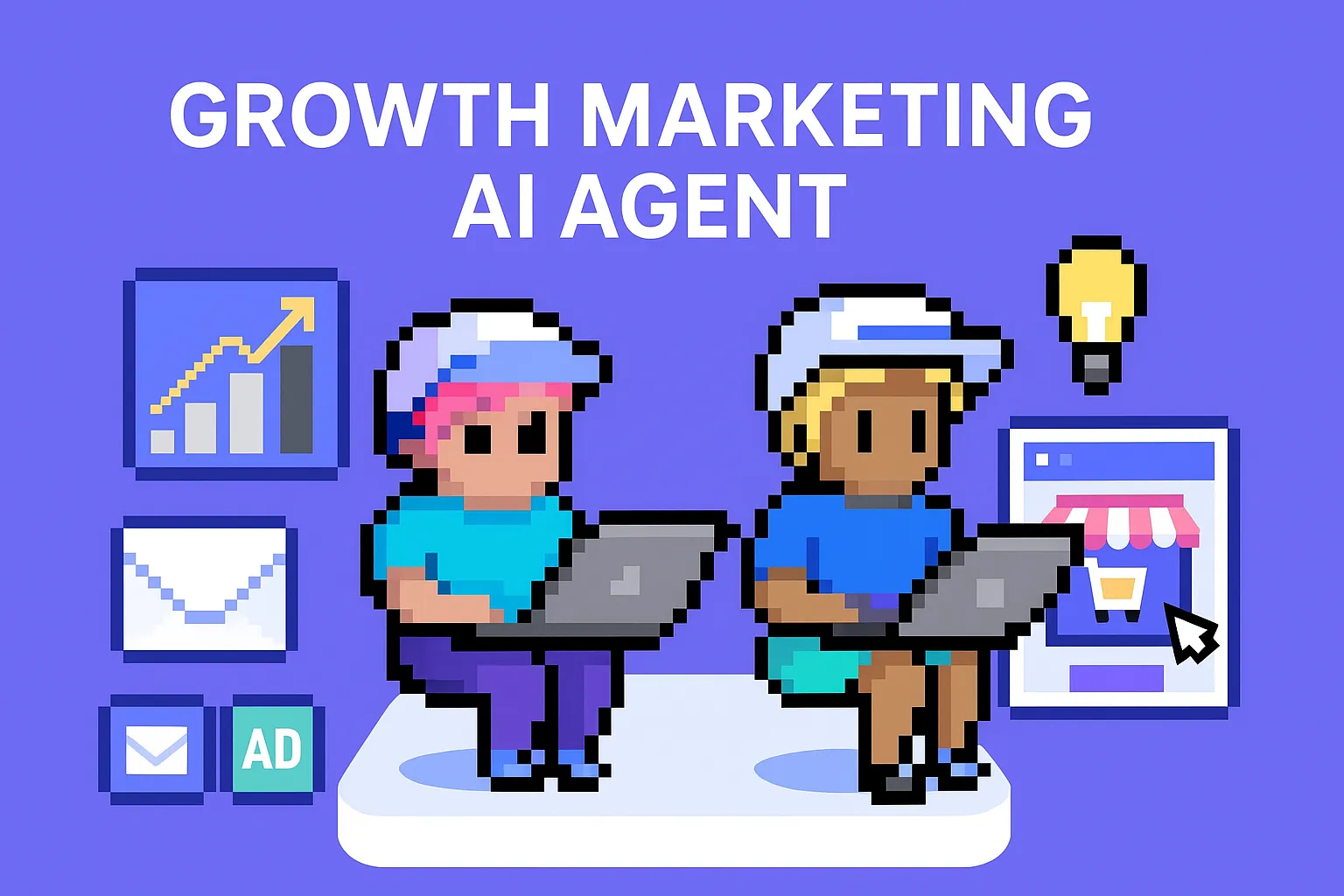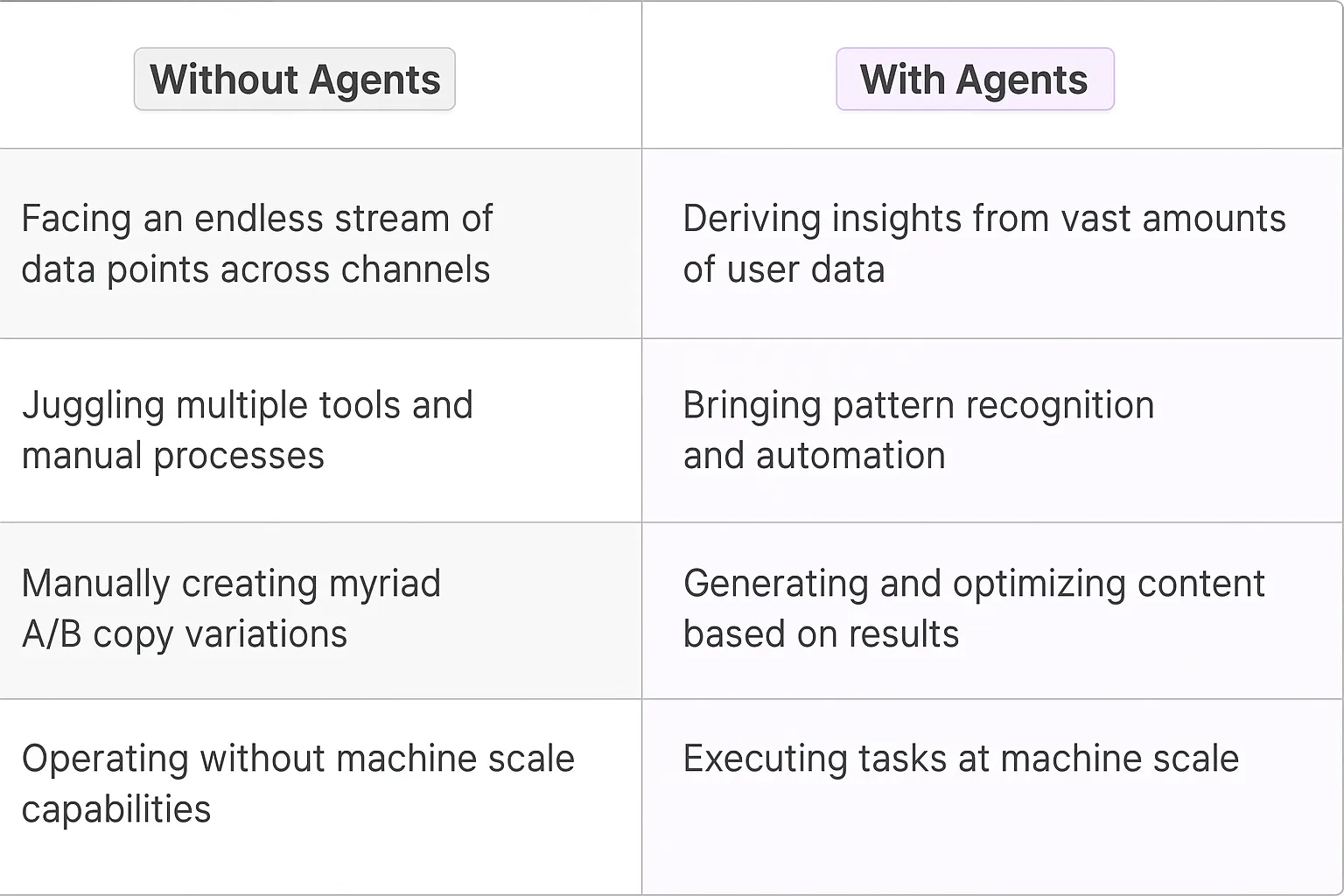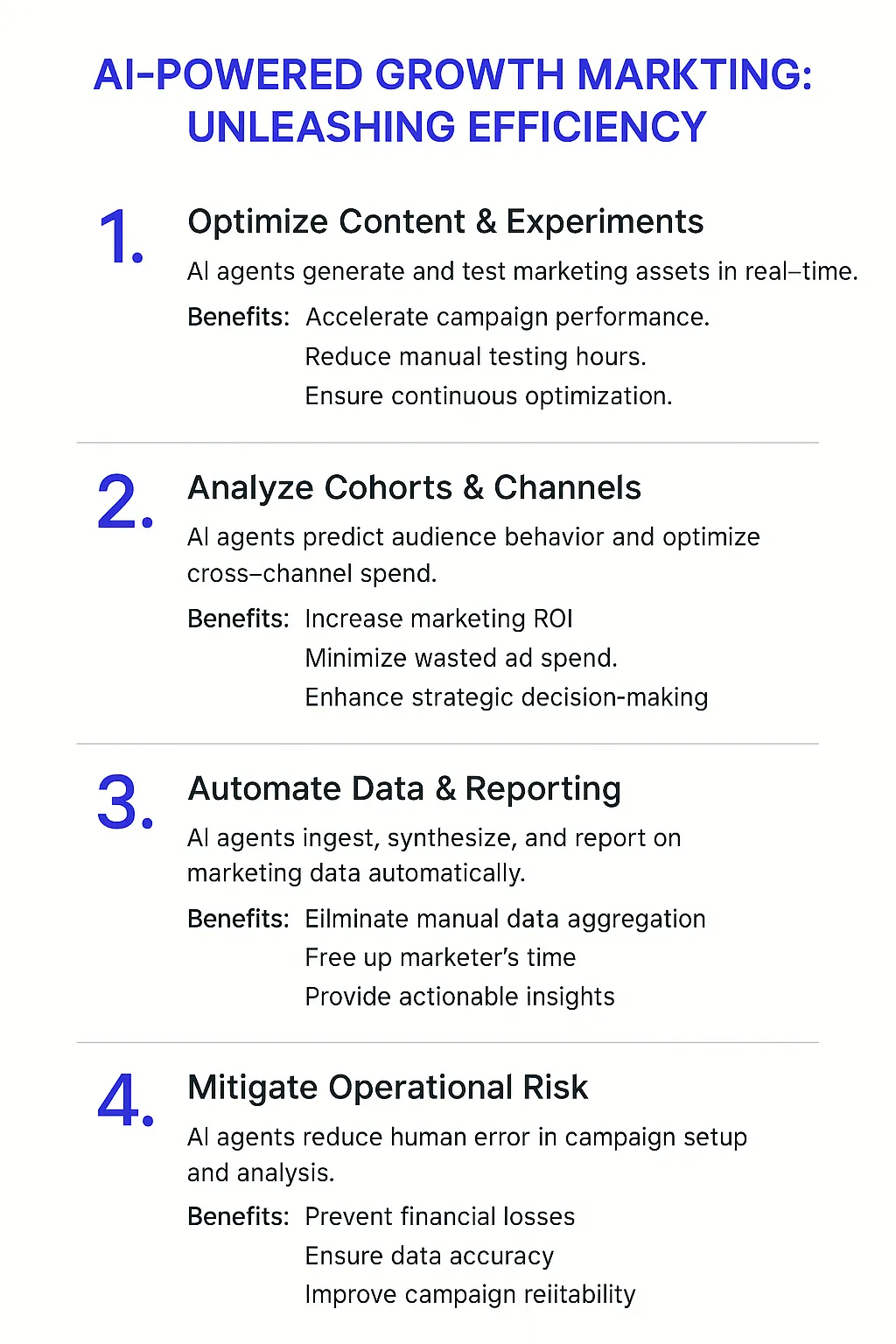Growth Marketing Manager is an AI-powered system that serves as a digital teammate for marketing professionals. It processes vast amounts of user data, executes complex marketing experiments, and provides data-driven insights that would be impossible to achieve manually. The system learns from every interaction, continuously improving its ability to identify winning strategies and optimize campaigns across channels.

Growth marketing managers traditionally juggled multiple point solutions and manual processes to execute their strategies. They'd spend countless hours in spreadsheets analyzing cohort data, writing copy variations for A/B tests, and coordinating with designers and developers to implement changes. The typical stack included tools like Google Analytics, Mixpanel for user behavior, separate email marketing platforms, and social media management tools - all operating in silos.
Digital teammates fundamentally transform how growth marketers operate by bringing pattern recognition and execution capabilities that operate at machine scale. The network effects here are fascinating - each interaction makes the entire system more intelligent.
The most compelling benefits include:
The key insight is that AI agents don't just automate existing workflows - they enable entirely new approaches to growth that weren't possible with human-only teams. They operate at a scale and speed that creates compounding advantages for companies that deploy them effectively.

Growth marketing managers face the constant challenge of scaling user acquisition while maintaining quality and managing complex data analysis. AI agents serve as digital teammates that handle repetitive tasks and provide data-driven insights, letting growth marketers focus on strategy and creative problem-solving.
The real power comes from combining these capabilities. For example, an AI agent can monitor campaign performance, identify underperforming segments, analyze historical data for similar patterns, and suggest optimization strategies - all while the growth marketer focuses on high-level strategy and creative solutions.
Growth marketing is fundamentally about rapid experimentation and learning. AI agents accelerate this cycle by handling data processing and initial analysis, allowing growth marketers to run more experiments and implement learnings faster.

Growth marketing managers face an endless stream of data points, A/B tests, and campaign optimizations across multiple channels. The versatility of AI agents in growth marketing creates powerful leverage points that transform how teams execute and scale their efforts. Let me break down the real-world applications I've seen work exceptionally well.
When you're running growth at scale, the ability to analyze patterns across channels while maintaining consistent brand voice becomes a major bottleneck. AI agents act as force multipliers - they can simultaneously monitor campaign performance, identify optimization opportunities, and help craft variations of marketing copy that maintains your core message. This isn't just about automation - it's about augmenting the strategic thinking that drives sustainable growth.
The most effective growth teams I've worked with use AI agents to create feedback loops between their quantitative and qualitative insights. These digital teammates can process customer feedback, match it against performance metrics, and surface actionable patterns that would take weeks to identify manually. This allows growth marketers to spend more time on strategy and creative direction rather than getting lost in spreadsheets and data analysis.
Growth marketing for e-commerce brands has become exponentially complex. When I worked with early-stage DTC companies, we'd manually analyze customer cohorts, test ad variations, and optimize landing pages. Now multiply that by 50 marketing channels, 1000s of customer segments, and infinite creative possibilities.
A Growth Marketing Manager AI Agent transforms this complexity into scalable execution. Take the example of a mid-sized fashion retailer I recently advised. Their marketing team was drowning in data but struggling to extract actionable insights. The AI agent analyzed their historical campaign performance across channels, identified micro-segments with the highest potential lifetime value, and dynamically adjusted creative elements based on real-time engagement signals.
The results were striking: The AI agent uncovered that women aged 28-32 in creative professions had a 3.4x higher conversion rate when shown product styling videos versus static images. It automatically generated and A/B tested dozens of video variations, optimizing for this segment's specific preferences around music, pacing, and visual style.
But the real power came from the agent's ability to simultaneously run hundreds of these micro-experiments across different customer segments. It identified that recent cart abandoners responded best to SMS reminders with personalized styling suggestions, while email was more effective for reactivating dormant customers through exclusive preview access.
The key insight: Growth Marketing Manager AI Agents don't just automate existing processes - they unlock entirely new possibilities for personalization and optimization at a scale no human team could achieve. They're not replacing growth marketers; they're giving them superpowers to execute their strategic vision across an exponentially larger surface area.
For e-commerce brands serious about scaling, this isn't just an efficiency tool - it's becoming table stakes for staying competitive in an increasingly sophisticated marketing landscape.
B2B SaaS growth marketing is a different beast entirely from consumer products. Having worked with dozens of enterprise software companies, I've seen firsthand how the complexity of long sales cycles and multi-stakeholder decisions creates unique challenges for scaling acquisition.
A Growth Marketing Manager AI Agent fundamentally changes this equation. Let me share a recent example from a Series B HR software company. Their traditional approach involved basic lead scoring and generic drip campaigns. The AI agent analyzed their entire customer journey - from first touch to closed deal - and discovered patterns human marketers had missed for years.
The agent identified that technical decision makers who engaged with product documentation within 48 hours of downloading a whitepaper were 5x more likely to convert to paid customers. It automatically created targeted content journeys for these high-intent prospects, serving them increasingly technical materials at precisely the right moments in their evaluation process.
What's fascinating is how the agent adapted its approach across different company sizes and industries. For enterprise prospects, it emphasized ROI calculators and case studies early in the journey. For mid-market companies, product comparison guides and integration documentation drove higher engagement. The agent continuously refined these segments based on real-time behavior data.
Most impressively, the AI agent orchestrated multi-channel sequences that previous A/B tests had missed. LinkedIn ads performed 2.3x better when preceded by relevant thought leadership content on Twitter. Email open rates jumped 40% when previous website interactions informed the subject line personalization.
The growth team shifted from manual campaign management to high-level strategy and creative direction. The AI agent handled the complex task of executing and optimizing thousands of micro-campaigns simultaneously, while the humans focused on developing new growth hypotheses and analyzing emerging patterns.
This is the future of B2B growth marketing - where AI agents manage the complexity of multi-channel, multi-stakeholder journeys at a scale that was previously impossible. The companies that embrace this shift will have an insurmountable advantage in their ability to acquire and convert enterprise customers.
Growth Marketing Manager AI agents require deep integration with multiple marketing tools and data sources. The complexity increases when connecting to legacy systems or proprietary marketing platforms. Data synchronization across various touchpoints - from CRM to analytics tools - demands careful architecture and robust error handling. Teams often underestimate the engineering resources needed to maintain these connections and handle API rate limits.
The effectiveness of growth marketing AI hinges on historical data quality. Many organizations discover their tracking implementations are incomplete or inconsistent only after deployment. Missing UTM parameters, broken conversion tracking, or incomplete customer journey data can severely limit the AI's ability to make accurate recommendations. Building a clean data foundation often takes 3-6 months longer than anticipated.
Marketing teams typically experience a 4-8 week adjustment period learning to collaborate with AI agents. Common friction points include trusting AI-generated copy variations, understanding confidence scores for predictions, and developing new workflows around A/B test analysis. Success requires redefining roles and establishing clear handoff points between human marketers and their digital teammates.
Growth Marketing AI agents need guardrails to maintain brand voice and regulatory compliance. Financial services and healthcare companies face additional challenges with HIPAA and FINRA requirements. Creating comprehensive brand guidelines that AI can interpret often reveals gaps in existing style documentation. Teams must develop new approval workflows to catch edge cases while maintaining campaign velocity.
Attribution becomes more complex with AI-driven growth campaigns. Traditional A/B testing frameworks may not capture the full impact of AI optimizations across multiple channels. Organizations need new metrics and reporting structures to evaluate the AI's contribution to growth outcomes. This often requires building custom analytics dashboards and retraining teams on new success metrics.
The relationship between AI usage and marketing ROI isn't always linear. High-frequency testing and continuous optimization can drive up computational costs. Teams need sophisticated monitoring systems to track AI resource consumption against campaign performance. Finding the sweet spot between automation depth and cost efficiency typically takes 2-3 quarters of active experimentation.
The adoption of Growth Marketing Manager AI Agents marks a fundamental shift in how companies approach growth. The technology doesn't just automate existing processes - it enables entirely new strategies that weren't possible before. Teams that successfully integrate these digital teammates gain compound advantages through faster experimentation cycles, deeper user insights, and more sophisticated optimization capabilities. The future belongs to growth teams that learn to effectively collaborate with AI agents while focusing their human creativity and strategic thinking on higher-level challenges.